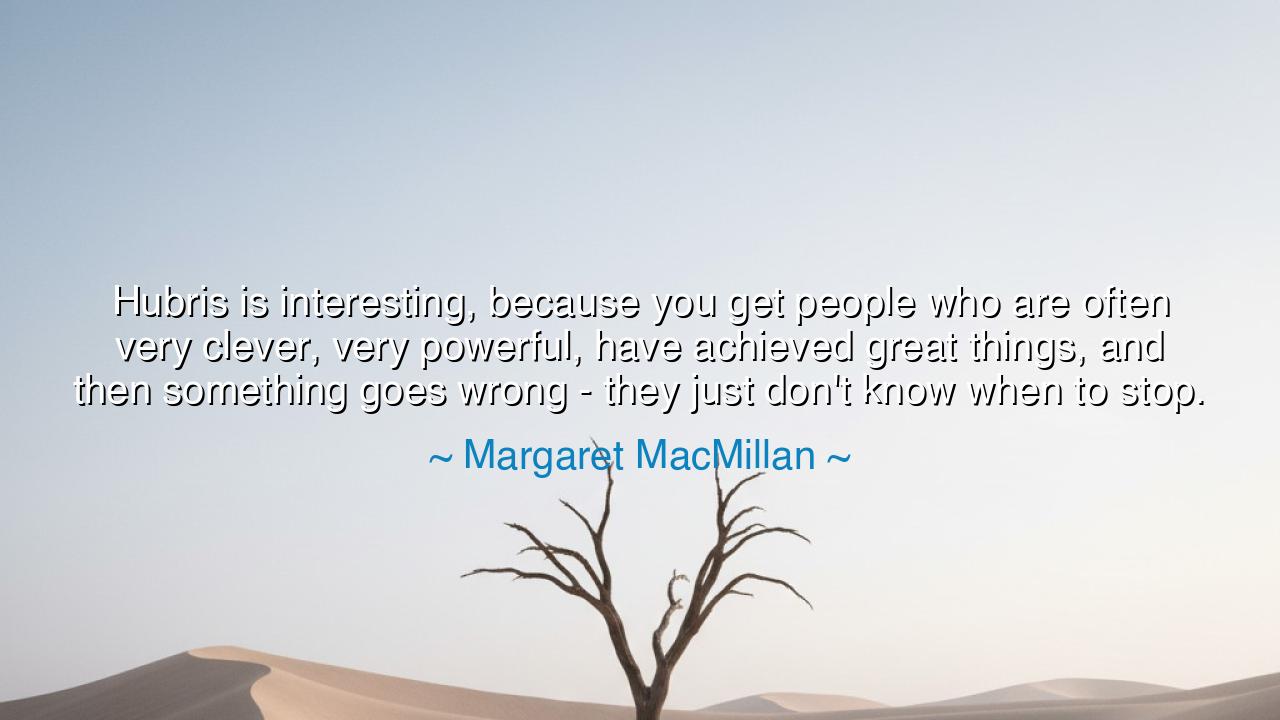
Hubris is interesting, because you get people who are often very
Hubris is interesting, because you get people who are often very clever, very powerful, have achieved great things, and then something goes wrong - they just don't know when to stop.






“Hubris is interesting, because you get people who are often very clever, very powerful, have achieved great things, and then something goes wrong — they just don’t know when to stop.” Thus spoke Margaret MacMillan, the wise historian who gazed upon the rise and fall of empires and discerned the oldest tragedy known to mankind. In these words, she touches the heart of a theme that echoes through every age: the peril of hubris, that fatal pride which blinds the mighty and drags them from glory into ruin. It is not the weak who fall to hubris, but the great—those who have soared so high that they forget the laws that bind all mortal things.
In the ancient world, the poets called hubris the sin of the gods’ challengers. It was not mere arrogance, but overreach—the moment when wisdom gives way to excess, when man believes himself invincible and ignores the warning of restraint. The Greeks wove this truth into their tragedies, that men might remember humility. Oedipus, in his brilliance, sought truth so fiercely that he destroyed himself by it. Achilles, the mightiest of warriors, could not master his wrath and thus doomed his own honor. And Icarus, intoxicated by flight, soared too close to the sun until his wings melted and he fell from the sky. All were touched by greatness; all were undone because they did not know when to stop.
Margaret MacMillan, who has studied kings and conquerors, saw the same pattern written upon the scroll of history. Napoleon Bonaparte, the genius of the battlefield, once commanded the destiny of Europe. Yet after victory upon victory, he could not rest. His ambition demanded more—more land, more glory, more immortality. He marched into Russia, where the snow itself became his enemy, and from that frozen wasteland his empire crumbled. What felled him was not weakness, but hubris—the refusal to accept limits, the belief that success was proof of infallibility. So it is with all who rise too high: the moment they cease to listen, to reflect, to restrain themselves, their greatness turns upon them like a sword.
Yet hubris is not confined to emperors and generals. It visits every soul that begins to mistake achievement for omnipotence. The scholar who thinks knowledge excuses cruelty, the artist who believes beauty makes him untouchable, the leader who confuses authority with wisdom—all stand upon the same precipice. Hubris whispers, “You are different. The rules do not apply to you.” And in that whisper lies the seed of downfall. For in the moral order of the universe, the proud are always recalled to humility, whether by fortune, by failure, or by time itself.
There is, however, a hidden mercy in this truth. For if hubris is the disease of the great, then humility is its cure—the awareness that one’s power, no matter how vast, is borrowed and fleeting. The wisest rulers of old understood this. Marcus Aurelius, emperor of Rome, wrote each night in his journal not of conquest, but of moderation: “Remember, you are but a man.” His greatness lay not in the number of his victories, but in his refusal to be mastered by them. He knew, as MacMillan warns us, that to stop when one should stop is the highest form of wisdom.
So what lesson do these words hold for us, who live not upon thrones but within the quiet battles of ordinary life? It is this: know your measure. Let your ambition be tempered by reflection; let your confidence be balanced by humility. When success crowns you, do not mistake its radiance for your own immortality. Ask yourself, “Have I done enough? Have I crossed from excellence into excess?” For the heart that can pause, that can say “enough,” is stronger than the one that only presses forward without end.
Take heed, then, of the pattern that repeats through history and heart alike: that the mighty fall not from failure, but from forgetfulness—forgetfulness of limits, of gratitude, of the smallness of man before eternity. Let us therefore walk the path of balance. Strive greatly, but know when to rest. Seek knowledge, but not vanity. Build, but do not worship what you have built. For as Margaret MacMillan reminds us, the greatest tragedy is not to fail before the summit, but to fall from its peak because one did not know when to stop.
In the end, wisdom is not in reaching the stars, but in knowing when to fold one’s wings and gaze upon them from below, content that one’s light—though brief—is bright enough.






AAdministratorAdministrator
Welcome, honored guests. Please leave a comment, we will respond soon